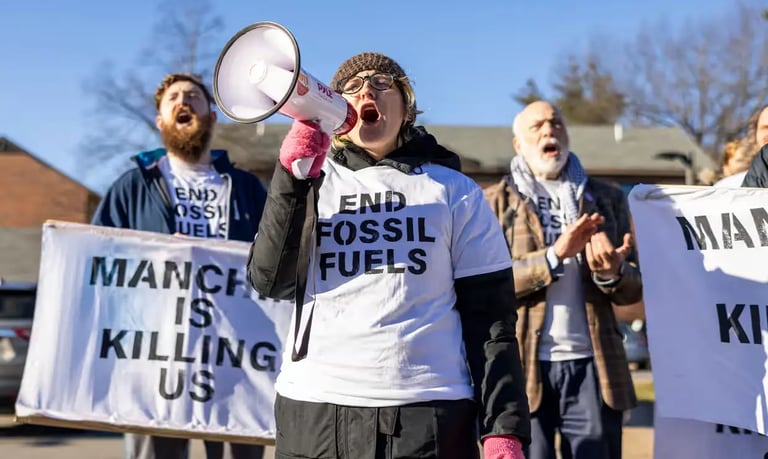Activists Pushing Boundaries: Will Bold Tactics Spark Climate Action?
ACTIVISMFEATURED


Amid the escalating climate crisis, protesters are adopting increasingly confrontational tactics, reflecting growing frustration and urgency. Recent incidents include direct confrontations with high-profile figures like the head of ExxonMobil and a US senator, where provocative language almost led to physical altercations. This shift towards personal, in-your-face activism underscores the deepening commitment of those seeking accountability from leaders they deem responsible for the climate emergency.
As the climate crisis has deepened, protesters have become more confrontational – and their ambitions have clearly grown .
Amid the escalating climate crisis, protesters are adopting increasingly confrontational tactics, reflecting growing frustration and urgency. Recent incidents include direct confrontations with high-profile figures like the head of ExxonMobil and a US senator, where provocative language almost led to physical altercations. This shift towards personal, in-your-face activism underscores the deepening commitment of those seeking accountability from leaders they deem responsible for the climate emergency.
Leading this charge is Climate Defiance, a small yet influential group marking its first year of activism by disrupting routine events attended by Biden administration officials, oil executives, and financiers. Despite their provocative methods, they have succeeded in drawing attention to their cause, especially during an election year, pressuring the Biden administration to prioritize climate issues.
Climate Defiance's tactics are often clandestine, involving unexpected disruptions followed by public shaming on social media. Their ambitions have expanded with their influence, culminating in plans for a mass protest to shut down the congressional baseball game—a symbolic action aimed at catapulting climate change into the top-tier issues of the upcoming election.
Michael Greenberg, the group's founder, criticizes mainstream climate groups for their passive approach, insisting on a more aggressive stance to counteract what he sees as the complacency of those perpetuating the crisis.
In crafting their confrontations for a social media audience, Climate Defiance has integrated provocative language and visuals to maximize impact. These tactics, although polarizing, aim to engage a younger demographic accustomed to scrolling through attention-grabbing content.
While such actions may not immediately sway policymakers like Senator Manchin, they serve a larger purpose in elevating climate change as a critical political issue. Despite mixed reactions, Climate Defiance has garnered support from progressive political figures and donors, reflecting a shift in the narrative around climate activism.
However, the effectiveness of these tactics remains uncertain, particularly in influencing broader public opinion on climate issues. The protests may even alienate some, leading to negative reactions and potential backlash.
As climate impacts intensify globally, the urgency of action becomes undeniable. Climate activists are challenging the status quo, forcing politicians and leaders to confront the realities of the crisis amidst growing public concern.
In this turbulent landscape, where the stakes are high and time is short, radical action is deemed necessary to break through apathy and drive meaningful change. Despite the controversy, these activists are determined to push climate change to the forefront of political agendas, demanding urgent action to address the existential threat facing our planet.
How Climate Defiance activists confront business leaders and politicians – video
What is climate change?
Climate refers to the long-term patterns of weather conditions in a particular region. It encompasses elements such as temperature, precipitation, wind patterns, and humidity. It is crucial to defend our climate because it plays a pivotal role in sustaining life on our mother planet. However, climate change poses a significant threat to our environment and ecosystems. The drastic increase in greenhouse gas emissions, primarily caused by human activities, is leading to rising global temperatures, extreme weather events, and the melting of polar ice caps. To make a positive change for a better tomorrow, we must take collective action. By reducing our carbon footprint, conserving energy, embracing renewable sources, and advocating for sustainable practices, we can mitigate the impact of climate change and protect our planet for future generations. Description not clear.
Now is the time to speak up and make your voice heard on the critical issue of climate change. Whether you support bold activism or advocate for different approaches, your perspective matters.
Join the conversation by sharing your thoughts and experiences in the comments below. How do you feel about the tactics used by climate activists? What actions do you believe are most effective in addressing the climate crisis?
Together, let's engage in a constructive dialogue and explore diverse viewpoints on this urgent issue. Your contribution could inspire others and contribute to the collective effort to tackle climate change.
Don't stay silent—share your story, insights, and ideas to help drive meaningful action and change. Together, we can make a difference in shaping a sustainable future for our planet.
